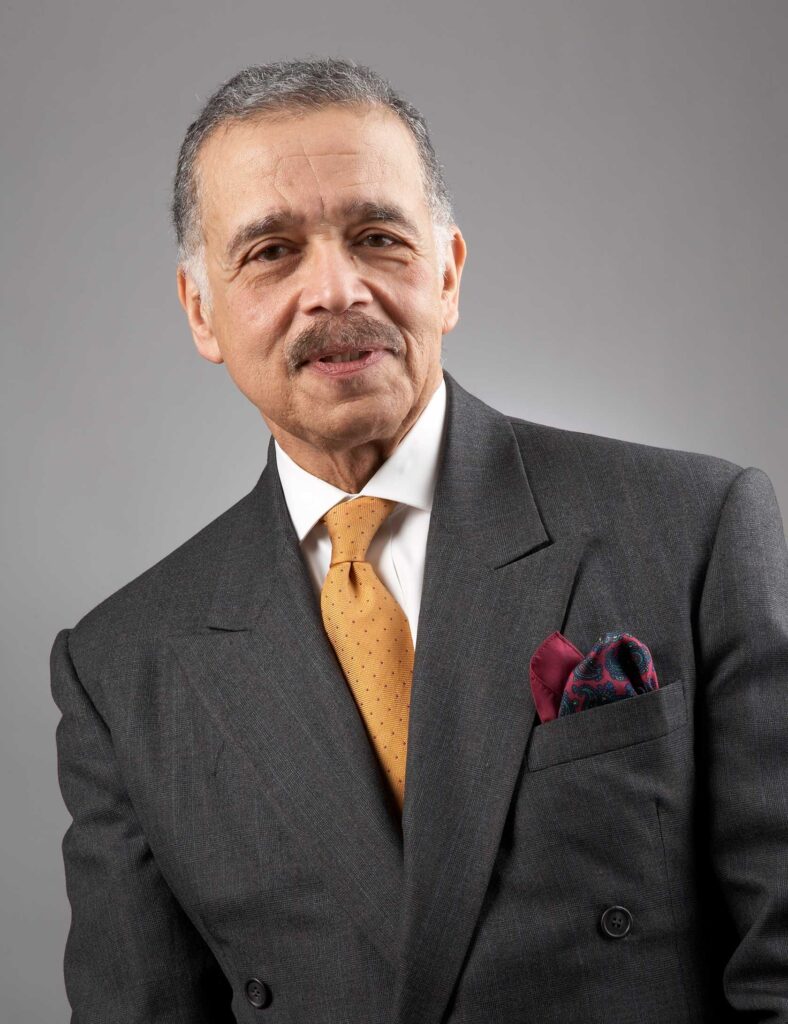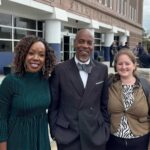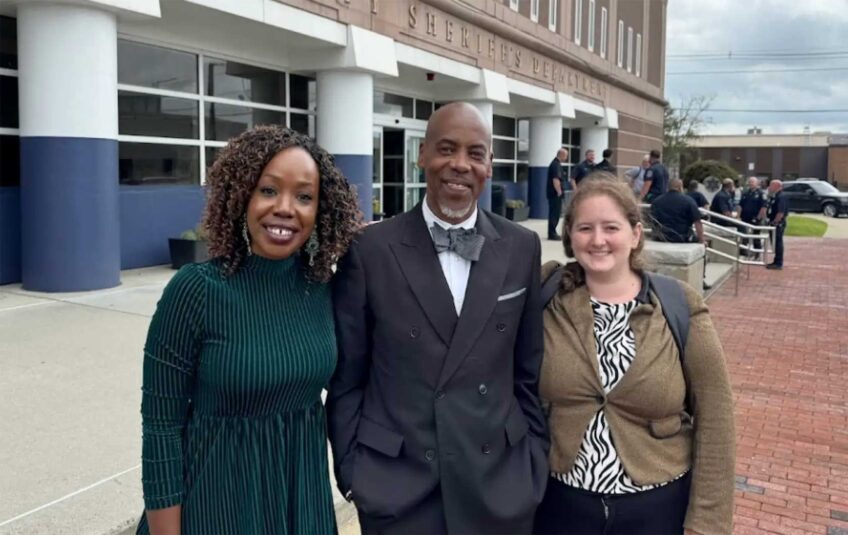
When the Bay State Banner’s first edition hit the streets in September 1965, the motto atop the front page reflected the values of the tight-knit Roxbury neighborhood where publisher Melvin B. Miller grew up.
The blocks around Munroe Park on Sugar Hill, a mix of spacious old Victorian homes, brick row-houses and classic Boston three-deckers, were filled with families ranging from Black Yankees with roots in the city stretching back centuries to recently arrived West Indians, Cape Verdeans and migrants from the South.
“Unity, Progress” and “Let’s Do It Ourselves” were not just self-help catch-phrases, but statements of purpose drawing on a long history of Boston’s African American community building churches and schools, challenging discrimination in the courts, advocating for legislative change, filling the ranks of Civil War regiments, running businesses and reaching the highest ranks of educational achievement in the Athens of America.
“It was a remarkable place to grow up,” said Miller, 88, sitting down in the living room of his rowhouse overlooking the distinctive puddingstone outcroppings of the park outside. “Frank Bullock, who was a star athlete at Dartmouth, lived nearby. He was appointed chair of the state parole board.”
He continued, “The Snowdens were also neighbors. Frank Snowden Sr. — we called him ‘The Colonel’ — served with distinction in World War II. One of his sons became a renowned classical scholar and another started Freedom House. Most people know Melnea Cass these days as a boulevard, but she was a neighbor — the First Lady of Roxbury who did so much to lift the community. This area produced doctors, lawyers, judges, and professors.”
Miller waved his hand as if taking in the whole neighborhood. “We grew up believing we could do anything.” The retired Banner editor and publisher, who recently sold the paper after a 57-year-run, has written extensively about his neighborhood — the “H Block” of Harold, Harrishof and Holworthy Streets and Humboldt Avenue — to instruct a new generation about the community ethos. But he also set out to reclaim the neighborhood from the “H-Block” gang that more recently adopted the old name as its moniker.
Miller’s father, John Johnson Miller, a son of Jamaican immigrants, was a postal supervisor born on the North Slope of Beacon Hill when the tenements rising above Cambridge Street formed the heart of Black Boston. As the African American population shifted from Beacon Hill and the West End towards Roxbury in the 1920s, families like the Millers settled into neighborhoods close to Franklin Park with many Jewish neighbors.
In the 1930s, composer Leonard Bernstein made his first public performances at the old Mishkan Tefila synagogue on Seaver Street. “I was a ‘shaboss goy,’” said Miller. “I would turn out the lights and do other tasks for Jewish neighbors who were forbidden to do such things on the Sabbath. It was a place where people from all walks of life lived. In many ways, it transcended race.”
Miller attended local grammar schools and gained admittance to the elite Boston Latin School, the nation’s oldest public high school, and, like so many “Sumus Primi” alums, went on to Harvard College. Mel and his younger brother Jack, an English High track star, ranged far from their “Streetcar Suburb” home, riding bikes and taking trolleys, subways and buses all over Boston to attend parties and dances and church socials.
The handsome duo, both tall and lanky, were popular boys and got along with their Irish and Italian schoolmates as well as the numbers runners and pool sharks around the taverns and clubs of Dudley Square and the South End. Their friends included burgeoning underworld figures like the Campbell brothers and the Flemmi family — future crimes bosses of Roxbury and South Boston — along with local celebrities like Eugene Wolcott, a violinist known as “Calypso Gene” who a generation later would become famous as Louis Farrakhan.
Malcolm Little, known on the street as Detroit Red, lived with his aunt on Dale Street just below Washington Park. Miller was just 12 when his Roxbury acquaintance went into the Bay State prison system to emerge six years later as Malcolm X.
Miller’s first brush with politics came during his sophomore year at Latin, in attorney Edward W. Brooke III’s 1950 campaign for state representative. The World War II veteran and future U.S. senator opened a law office on Humboldt Avenue after graduating from Boston University Law School. Urged to enter politics, he was reluctant. “‘But Mrs. O’Banyoun, I’m from out of town,’” Miller recalled Brooke saying to his aunt. “‘Oh, don’t worry about that,’ she told him. ‘Everyone here is from somewhere else.’”
Brooke lost successive races for a seat on Beacon Hill. Then just a teenager, Miller said he considered himself one of “Ed’s sidekicks. He almost became like a big brother to me. When he needed something done and done fast, he’d call me.”
When Miller headed over to Cambridge after graduation from Latin School in 1952, the 6-foot-3 freshman with the erect bearing and Boston accent made friends easily, including future U.S. Sen. Edward M. Kennedy and the future Aga Khan, ruler of the Ismaili sect of Islam. “My experience in college was different from most. I never felt inferior or unaccepted,” said Miller. “Of course, I couldn’t afford to travel to the places some of my friends invited me to — like skiing in Switzerland. I said that if I can’t pay, I can’t go.”
As a sophomore in 1953, Miller joined Alpha Phi Alpha and met fraternity brother Martin L. King Jr., then a doctoral student at Boston University, at the first meeting. A decade later, in the midst of civil rights protests, King called Miller and asked him to join the crusade in Alabama.
“King said to me, ‘You know, this is non-violent,’” recalled Miller. “I told him, ‘Well, I respect that, but if someone spits on me and calls me names, that’s the end of non-violence. I’m from Boston. That’s not the Boston standard.’”
Miller paused. “Needless to say, I didn’t go.”
Following graduation from Harvard, Miller was drafted into the Cold War army and left the U.S. as a medic posted to Germany. He spent two years around Frankfurt and traveled widely across Europe, grabbing spare seats on military transports to fly to London, Madrid, Rome and other capitals for weekends out of uniform.
In Paris, with protests and bombings over the Algerian battle for independence rattling the city, Miller said he was often mistaken for an Arab and even briefly detained by police. “I got thrown up against a wall and arrested,” he said.
After his honorable discharge in 1958, Miller worked as a substitute teacher, sold mutual funds and studied German. He spent time with friends who lived in a house on poet Robert Frost’s property in Vermont and took meals at times with the taciturn bard.
After two years of kicking about, “it was time to shift gears,” said Miller, “and so I went to law school.”
Miller headed to Columbia in New York City, where brother Jack was studying at NYU. The Boston duo easily fell into the swing of New York, making friends with a young, ambitious set of aspiring lawyers, architects, writers, actors and singers, from Harry Belafonte and Sidney Poitier to J. Max Bond and Constance Baker Motley.
When Miller returned to Boston in 1964 with his law degree, the Civil Rights Act had just passed. He was appointed an assistant U.S. attorney — a rare honor for a recent law grad — and worked under future Judge W. Arthur Garrity.
Just the year before, Miller’s political mentor Ed Brooke had won a stunning upset in the Republican primary to defeat Brahmin golden boy Elliott Richardson, and then cruised to a 13-point victory over former lieutenant governor Francis E. “Sweepstakes” Kelly in the general election for attorney general.
Brooke, considered by Miller the most talented politician of his generation, won his race during what was otherwise a Democratic sweep, even earning plaudits from President John F. Kennedy, who called Brooke’s win one of the most significant results of the electoral season.
Miller, moved by the spirit of public service embodied by an activist federal government and Brooke’s pioneering victory, threw himself into his work in the U.S. attorney’s office.
But fate had other plans.
The battle over inadequate schools for Black children in Boston was heating up. Debates raged over plans to raze whole neighborhoods in a sweeping vision of urban renewal. The U.S. advisory role in Vietnam was slipping rapidly towards deployment of combat forces. A seminal voting rights bill was stalled in Congress.
An earlier generation of Bostonians had turned to Black publications like NAACP co-founder William Monroe Trotter’s The Guardian to follow news of particular interest to African Americans. But Trotter had died just a few months before Miller’s birth, and the paper, run until its demise by his sister Maude and brother-in-law Dr. Charles Steward, had ceased publication in 1950.
Miller’s father had been a paper boy selling the Guardian on the streets of Boston. Miller grew up imbued with the sense of righteous fervor that Trotter carried into the battle for equal rights, even getting thrown out of the White House by President Wilson for challenging the racist Virginian for backsliding on integration.
Miller recruited Otis Gates, a Latin School and Harvard College classmate, to launch a successor to the Guardian. Equipped with more passion than capital or experience, they convinced Bryant Rollins, one of the few Black reporters at the Boston Globe, to become the paper’s founding editor.
Opening in an office on Warren Street, the paper almost immediately ran into financial trouble. Meanwhile, Miller’s outspoken editorials — soon to become a staple of Boston’s Black journalistic diet — irritated higher-ups in the Justice Department, who had to answer for a junior attorney criticizing the Johnson administration across a broad range of issues.
Miller resigned from the U.S. attorney’s office, saving his friend Garrity from political pressure, and turned full-time to the Banner. His partner Otis Gates left for California. Miller gave up a salary in order to meet staff payroll and moved into a room in his brother Jack’s apartment with his sibling’s young family.
His father expressed concern for his son’s welfare, recalled Miller.
“Melvin,” he said, “are you making any money at the paper?” Miller said no.
“But are you enjoying it?” Again, Miller shook his head.
“Then why don’t you get another job you don’t like that at least pays you a decent wage?”
Miller shook his head at the memory. “The real reason my father was worried was that he had seen what had happened to Trotter — a great man who had given his whole life and career to help the community left broken and alone at the end. He didn’t want to see the same thing happen to me.”
It didn’t. The paper recovered enough that Miller was able to return to practicing law. His young and eager multiracial staff, led at one point by future New York Times reporter Lee Daniels, covered the fight over busing, the battle over a highway extension threatening to bulldoze the heart of Black Boston, growing protests over apartheid, and efforts to increase African American voter representation in City Hall and the State House.
In his editorials, Miller stood up for the Rev. Martin Luther King Jr. when the NAACP criticized the Nobel Peace Prize laureate after he went after tobacco and liquor companies — major donors to the organization — for spreading poison in the community. He called the Vietnam War effort for what it was — a misguided mission. He put a headline over a story about police misconduct during a welfare rights demonstration — “Police Riot in Grove Hall” — that incurred anger from cops and City Hall.
Miller and the Banner slowly gained influence and respect. He opened a law firm with Harrison Fitch and Dennis Tourse — three powerhouse Black lawyers operating downtown — and became vice chairman of the Boston Water and Sewer Commission, overseeing its transition to a quasi-public agency and a $65 million bond issue backed by Goldman Sachs.
Miller was a player in the takeover of Channel 7’s broadcast license by a multiracial group that included Star Market heir David Mugar and educational activist Ruth Batson. He served as general counsel to the station, which made significant advances in the hiring of African American producers and on-air talent.
He also helped save Unity Bank and Trust Company, the city’s first minority-owned retail bank, when it faltered, stepping in as conservator appointed by the state and ushering in its successful revival as the Boston Bank of Commerce.
He became a long-time trustee of Boston University, forging a deep personal friendship with fellow iconoclast John Silber. That didn’t stop the Banner from covering the Boston University president’s controversial statements about drugs and crime in the Black community during his ill-fated run for governor in 1990.
He advocated for greater hiring of Blacks on the police department and even gave rides to his childhood friend Billy Celester — a future police superintendent — to police training classes when Celester’s car broke down.
Some of his stances, like endorsing David Finnegan of West Roxbury over South End state Rep. Mel King in the 1983 Boston mayoral preliminary contest, confirmed Miller as someone willing to go out on a limb to speak his mind. He argued that Boston’s Black community, unlike Chicago’s, which propelled Harold Washington to office, was not big enough to elect the city’s first Black mayor. He was right on the facts. King became the first African American mayoral finalist in Boston history, but, endorsed by Miller in the final, lost to Ray Flynn.
Miller’s decision to run for Congress in 1972 after social worker and professor Hubie Jones, a Newton resident, decided to enter the race to unseat the race-baiting Louise Day Hicks, also did not endear him to the consensus crowd. Miller said Black voters deserved a voice in the race from someone who lived in the district rather than the suburbs.
By the time the Banner had reached its 50-year milestone, both Miller and the paper had become Boston institutions — slightly irascible but widely respected, his wife Sandra Casagrand as associate publisher, sister Karen as health editor and nephew Yawu as senior editor. Other nephews worked at the paper at one time — a fully stocked family enterprise.
The paper steadily chugged along, covering Deval Patrick’s rise as the first Black governor, Barack Obama’s election as the first Black president and Kim Janey’s elevation to Boston mayor after Marty Walsh took a cabinet seat, yielding control of City Hall to the city council president.
There were financial challenges along the way — and a reprise of Miller not taking a paycheck — but the paper continued to provide Black perspective on the reparations debate, long-shot efforts for Black Boston to secede from the city, gentrification, economic development and the arts.
Miller, who is now writing a memoir about growing up on the H Block, last year received a coveted Yankee Quill award from his peers in the New England newspaper industry, and published “Boston’s Banner Years, 1965-2015: A Saga of Black Success” to mark five decades of political and social advancement of Blacks in Boston.
Just last month, his name joined those of three-score community heroes set in bronze letters in the granite paving around “The Embrace” statue on Boston Common — dedicated in front of an overflow crowd to Miller’s fraternity brother, the Rev. Martin L. King Jr., and his wife Coretta Scott King.
From Colonial whale captain Paul Cuffee and poetess Phillis Wheatley to abolitionist leader Frederick Douglass and scholar W.E.B. Du Bois, Boston’s Black history, as Miller will readily tell you, is full of remarkable people and remarkable stories.
“We can’t ever forget what we’ve accomplished and what we’re capable of doing,” said Miller. “Young people need to know where we came from. Before Doc Steward died in 1967 — he was the last of the Boston Radicals — he granted his blessings to the Bay State Banner as the successor to the Guardian. That’s what I set out to do. Follow in those footsteps.”














